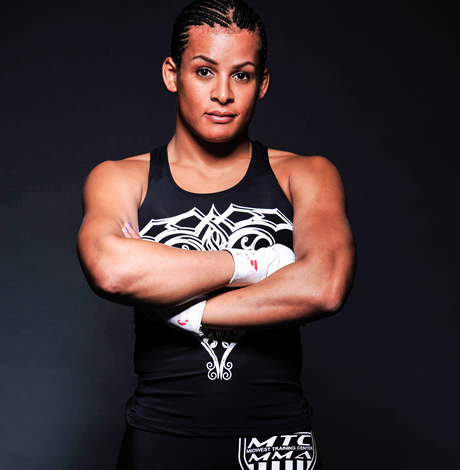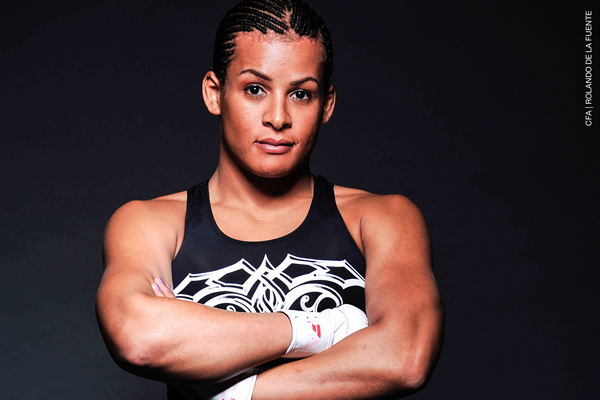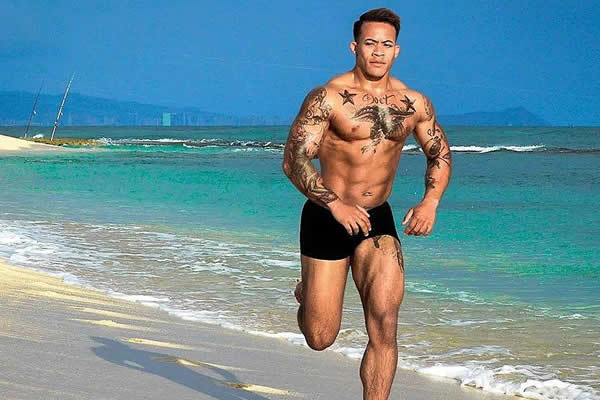Sports
Meet the trans athletes
From golf to dodgeball, out competitors helping to change the rules


Fallon Fox (Photo by Rolando de la Fuente; courtesy CFA)
The United States has an estimated transgender population of 700,000 people, according to UCLA’s Williams Institute.
What this means for the sports community is that the standards and rules that have been put in place by the many different sports need to include provisions enabling transgender people to participate according to their proper gender identity.
Organizations such as the National Collegiate Athletic Association (NCAA), the International Olympic Committee, the Ladies Professional Golf Association and the United States Soccer Federation have all adopted such policies.
Many of the policies adopted by the governing sports bodies require surgical or hormonal treatment verification prior to competitions. This creates economic barriers for the athletes due to high surgical costs, which are rarely covered by insurance carriers.
Interscholastic athletics are governed by state athletic associations and each of the 50 organizations must put in place their own polices. To date, several have adopted a wide range of policies, not all of which are as inclusive as they should be.
What we have been seeing too often is that the rules are not being followed and the trans athletes are being subjected to discrimination.
Below is a list of just a few of the trans athletes who are competing openly and that have received the permission required from their sports’ governing bodies.
Schuylar Bailar. While he was in high school in McLean, Va., Bailar was recruited by the Harvard women’s swim team. Now 19, he took a year off to transition and subsequently received an invitation to swim on the Harvard men’s team this fall. The governing body for Harvard sports is the NCAA, which has a recommended policy, but each individual school adopts its own policy.
Fallon Fox. After some initial struggles with licensing and discrimination, Fox is competing in mixed martial arts (MMA). Originally from Toledo, Ohio, her last match was the Prize Fighting Championship 10 in Denver on Aug. 14. Licensing is state-run and she has been promoted in the past by the Championship Fighting Alliance.
Chris Mosier. Mosier is from Chicago and is the executive director of GO! Athletes. He is also the founder of transathlete.com. He recently qualified to represent Team USA at the 2016 Duathlon World Championships in Spain in the men’s 35-39 category. The governing bodies are USA Triathlon and the International Triathlon Union.
Gabrielle Ludwig. In 2012, in the middle of a debate over transgender legislation in California, Ludwig returned to the sport of basketball at age 51 by joining the Mission College of Santa Clara team where she played for two years. The 6’6” Ludwig grew up in Wyoming and New York and is a Desert Storm veteran. Assembly Bill 1266 went into effect on Jan. 1, 2014 and requires that California schools respect the gender identity of all students and allow them to participate in all activities, including sports.
Ryland Whittington. Whittington is from San Diego and was diagnosed as deaf at 13 months old in 2009. After receiving his cochlear implants at 19 months, he began communicating to his parents that he identified as a boy. Because he lives in California, he will be allowed to play soccer with no barriers. The sport’s governing body is the California Interscholastic Federation.
Savannah Burton. Burton is originally from Corner Brook, Newfoundland and Labrador in Canada and rowed with another trans teammate in the Canadian Sculling Marathon in 2014. This year she was one of eight women selected to compete for the Canadian national team for the World Dodgeball Championships that were just held Aug. 15-16 in Las Vegas. Her impact has affected multiple sports bodies, including Team Canada, the Canadian Dodgeball Association and the World Dodgeball Federation.
Jazz Jennings. Florida-born Jennings is a 14-year-old YouTube celebrity, spokesperson, LGBTQ activist and athlete. She and her family fought for more than two years for her to be allowed to play on the local girls’ soccer team. The United States Soccer Federation stepped in and created a trans-inclusive policy for youth and adult recreation soccer players of all ages that required the Florida soccer league to allow Jennings to play.

Sgt. Shane Ortega (Photo courtesy ACLU)
Shane Ortega. Ortega is active duty Army and competed in his first physique competition in Honolulu in June where he qualified for junior nationals. At his second competition this September, the Paradise Cup, the 28-year-old will attempt to qualify for nationals. Ortega is stationed in Hawaii and grew up on military bases around the country as well as with family while his mother was deployed. His participation was approved by the National Physique Committee.
Dr. Bobbi Lancaster. Hailing from Chatham, Ontario and residing in the Phoenix area, Lancaster is pursuing a spot on the Ladies Professional Golf Association (LPGA) tour. At age 64, she is currently playing on the Cactus Tour, which serves as a gateway to the LPGA. In 2011, the LPGA’s membership voted to join other sports bodies, including the International Olympic Committee and USA Track and Field, in eliminating the “female at birth” clause from its constitution.
Matt Dawkins. Dawkins, 17, will be a senior at Cherokee High School this fall in Marlton, N.J. He competed in his first meet on the boys’ track team in April and won his heat in the 100. His time was sixth best among 19 Cherokee boys. He is protected by the New Jersey State Interscholastic Athletic Association’s transgender policy.
Pat Griffin contributed to this report. A list of transgender athlete inclusion policies can be found at transathlete.com.
Sports
‘Heated Rivalry’ stars to participate in Olympic torch relay
Games to take place next month in Italy

“Heated Rivalry” stars Hudson Williams and Connor Storrie will participate in the Olympic torch relay ahead of the 2026 Winter Olympics that will take place next month in Italy.
HBO Max, which distributes “Heated Rivalry” in the U.S., made the announcement on Thursday in a press release.
The games will take place in Milan and Cortina from Feb. 6-22. The HBO Max announcement did not specifically say when Williams and Storrie will participate in the torch relay.

The Washington Capitals will host Pride Night on Saturday, Jan. 17, when they host the Florida Panthers at Capital One Arena. A special ticket offer featuring a Pride-themed Capitals rainbow jersey is available at washcaps.com.
Fans are invited to a pre-game Block Party at District E beginning at 5 p.m. The event will feature a performance by the band NovaKane. Specialty happy hour food and beverages will be available, as well as giveaways. There will also be a presence by several local LGBTQ+ community organizations.
Egypt
Iran, Egypt object to playing in Seattle World Cup ‘Pride Match’
Game to take place on June 26

Iran and Egypt have objected to playing in a “Pride Match” that will take place in Seattle during the 2026 World Cup.
The Egyptian Football Association on Tuesday said it told FIFA Secretary General Mattias Grafström in a letter that “it categorically rejects holding any activities related to supporting (homosexuality) during the match between the Egyptian national team and Iran, scheduled to be held in Seattle, USA, on June 26, 2026, in the third round of the group stage of the 2026 World Cup.” Football Federation Islamic Republic of Iran President Mehdi Taj told ISNA, a semi-official Iranian news agency that both his country and Egypt “protested this issue.”
The 2026 World Cup will take place in the U.S., Canada, and Mexico. The draw took place at the Kennedy Center on Dec. 5.
Iran is among the handful of countries in which consensual same-sex sexual relations remain punishable by death.
The State Department’s 2023 human rights report notes that while Egyptian law “did not explicitly criminalize consensual same-sex sexual activity, authorities regularly arrested and prosecuted LGBTQI+ persons on charges including ‘debauchery,’ prostitution, and ‘violating family values.’” Egyptian authorities “also reportedly prosecuted LGBTQI+ individuals for ‘misuse of social media.’”
“This resulted in de facto criminalization of same-sex conduct and identity,” notes the report.
The 2024 human rights report the State Department released earlier this year did not include LGBTQ-specific references.
Soccer has ‘unique power to unite people across borders, cultures, and beliefs’
The June 26 match between Iran and Egypt coincides with Seattle Pride. The Washington Post reported the Seattle FIFA World Cup 2026 Local Organizing Committee decided to hold the “Pride Match” before last week’s draw.
“As the Local Organizing Committee, SeattleFWC26’s role is to prepare our city to host the matches and manage the city experience outside of Seattle Stadium,” said SeattleFWC26 Vice President of Communications Hana Tadesse in a statement the committee sent to the Washington Blade on Wednesday. “SeattleFWC26 is moving forward as planned with our community programming outside the stadium during Pride weekend and throughout the tournament, partnering with LGBTQ+ leaders, artists, and business owners to elevate existing Pride celebrations across Washington.”
“Football has a unique power to unite people across borders, cultures, and beliefs,” added Tadeese. “The Pacific Northwest is home to one of the nation’s largest Iranian-American communities, a thriving Egyptian diaspora, and rich communities representing all nations we’re hosting in Seattle. We’re committed to ensuring all residents and visitors experience the warmth, respect, and dignity that defines our region.”
The 2034 World Cup will take place in Saudi Arabia.
Consensual same-sex sexual relations remain punishable by death in the country. The 2022 World Cup took place in neighboring Qatar, despite concerns over the country’s anti-LGBTQ rights record.

















